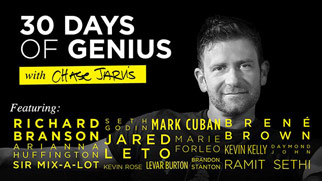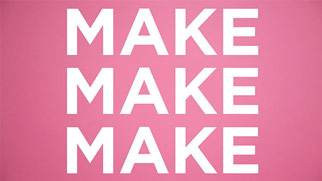
ARGH... Contracts!!!!
Are you a photographer, filmmaker or creative type and find yourself bogged down by contracts and legal documents? No where to turn? Do contracts make you want to scream? Well hello friends. It’s me Kate, Executive Producer over here at Chase Jarvis Inc. One of my roles as EP is to deal with all of the legal schmegal that comes through our shop and –while I have an excellent lawyer that I always consult– I feel your pain. Over the years I’ve learned a fair bit and now try to do as much of the legwork as I can reasonably do to keep legal costs as low as possible. You may want to consider this approach – it has saved us thousands of dollars.
I will start by stating very overtly that I am NOT a lawyer and can’t give you legal advice. This post is not said advice. I do, however, think that–by example–it could be really helpful if I were to break down one common contract that photographers often get asked to sign before a project – the Non Disclosure Agreement (the “NDA”) AND THEN outline some generally helpful tips regarding contracts in general. This won’t give you all the details, but it will give you an important foundation, an approach, on which to build. That’s the point of this post – here goes:
Example: The Non-Disclosure Agreement (NDA).
The NDA is a contract that is also commonly known as a confidentiality agreement or secrecy agreement. It is a legal contract between at least two parties that protects the discloser (person sharing the info) and the confidential information when they share information with a recipient (person receiving the information) for a specific purpose. You may be asked to sign one any time an individual or company feels that they are sharing confidential information with you. This is certainly smart business practice for sharing sensitive information… IN FACT, you may even want to have your own NDA to protect your own confidential information if you’re in a positon to share such info with contractors, etc.
My Top 10 Checklist for NDAs
Below you will find ten things to consider as you review any NDA. And again, you should definitely consult a lawyer, but this is a great starting point:
- Is there a “Purpose” or “Project” clearly defined? This will limit your confidentiality requirements to the specific project on which you are working.
- Do the disclosure terms favor the party sharing the most information? It is designed to protect the discloser.
- Does the agreement need to be mutual or not? You might be sharing confidential information on the project too. If you are, you may want to use an MNDA (Mutual Non-Disclosure Agreement).
- What is included in the definition of “Confidential Information?” Is this reasonable?
- Is there a “Feedback” clause? This explains what rights the discloser will have to any of YOUR feedback. For example, it may say that your suggestions or recommendations belong to the discloser. You should decide if this is ok for you.
- Review the “Term” (period of time for the contract) and “Termination” (how the contract may be ended). Both of these elements should be appropriate to the project.
- Is there a “Survival” clause? This states that should you end the contract, certain parts of the contract may always be valid. Know and understand what these elements are, so you are sure to be in compliance.
- Read the “Boilerplate” (that means the standard sections) even though it may seem boring.
- State of law. If troubles develop down the line and legal action is required, where would the proceedings would take place. You may not be able to change this one, but it is good to know.
- Look for the standard exceptions to confidentiality. These favor YOU, the recipient, and state when and if information is NOT considered confidential or when it may be shared. In NON-legal jargon, these are examples:
- You knew the information before it was disclosed to you AND YOU CAN PROVE/DOCUMENT IT.
- The information is or becomes publicly available (in a legal way and not through breach of any contract.)
- The information becomes LAWFULLY available from a third party (that means NOT through your company or the disclosing company). And again, it must be legal, without any violation of confidentiality obligations.
- You independently develop what is protected by the confidentiality WITHOUT the use of the confidential information. Be VERY careful with this one.
- You are legally required to disclose the information. Just make sure you really are legally required to do so before you do. Also, you would want to determine with your lawyer if you are required to or should notify the company.
Some companies have developed really excellent NDAs that are perfectly good to sign in their original state. Others may just have a stock NDA that is quite broad and may even feel that it doesn’t make sense for your situation. You are looking to make sure that whatever you sign works for your company and the purpose of your project. I have the impression that many recipients believe that they MUST sign the NDA AS-IS in order to even be considered for the project. While that MAY be the case, in my experience, I have found that companies have been very open to suggestions IF the following is true:
- they are reasonable requests and
- I make it easy for them. They do NOT want more work, so I always send the client two things when I’m requesting changes:
- a “Red Line” version of their own NDA, which shows the changes I and/or my lawyer have made within the document, and
- a SIGNED, clean copy for them. That way, if they agree to our changes, they already have what they need. (This is often a magical technique that demonstrates efficiency and understandingl
If the company is not open to making any changes, it’s up to you to decide with your lawyer if you are willing to sign the contract with a real understanding of what your risks are.
Finally, Some General Contract Thoughts.
In this post, we looked at one specific kind of contract, but there are so many more… JOY! As you go forth, with your pen poised to sign away, stop first and consider the following before you sign anything [and did I mention that I am NOT a lawyer?? So, please take these thoughts with a grain of salt. These are just my thoughts after working in this capacity with Chase for so many years.]
- ALWAYS read and understand what your are signing.
- Seek advice. I know that legal advice can be very expensive, but know that getting into a bad agreement can be far worse. Sometimes it can be more economical to belong to professional organizations to get access to legal support, discounted legal advice or even documents. Try ASMP.org for resources around legal documents.
- Stay positive in you negotiations around contracts. It is GREAT NEWS that a client wants to work with you!! Contracts are just one of the steps to the end goal of a fantastic job. You may not get everything that you ask for, but through the process you will understand what your are signing up for and make sure to avoid any ‘deal breakers.’
- Always keeps copies of the agreement that are signed by both parties.
- Note any requirements from the agreement you may have to follow through with later.
Best of luck to you in your legal endeavors! Until next time, Kate

























Great post Kate! My secret weapon with respect to managing contracts and creating the best possible experience with my client or collaborators is this groovy web tool: http://contractual.ly/
Cheers!
Great insight as usual!
I also recommend reading Maria Brophy’s pieces on the subject, especially her post on contract red flags: http://mariabrophy.com/business-of-art/artists-beware-of-these-red-flags-in-contracts.html
She’s a fantastic resource for art/business.
Great tips – thanks for posting this Kate! Always love reading what you guys are up to and love your generous spirit of sharing.
Lara
Chase you are a huge blessing to photographers and creative types alike. This past year your blogs and Chase Jarvis Live broadcast has helped me along the way in getting my photography business off the ground.When I hit a wall and can’t think of what to do next. I often resort to your library of insightful interviews for inspiration and encouragement.
Thanks bro-ham for what you do!
Love Ya,
Man
Steve Ethridge Photography.
Despite everything we know about contracts, are they not really a problem that humanity never solved? A great, anachronistic failure. Like the internet were written in latin and we needed latin scholars to decipher it. And the message is – wait for it – whatever happens, it’s not our fault. This is our protection. Our talisman. Our shield. Our mumbo jumbo hex on you. It’s a form of superstition, spells and magic.
Of course, from a business point of view, we all need contracts and disclaimers and terms and conditions and waivers and agreements and so on. But from an alien point of view… pure sorcery.